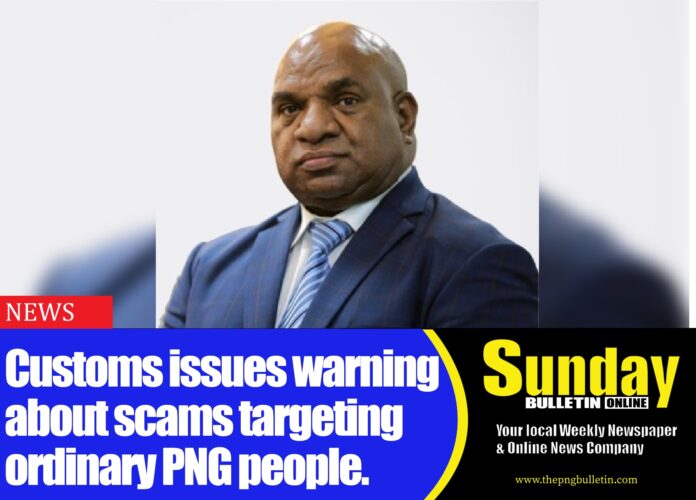
The PNG Customs Service is once again reminding the general public to be cautious of scams involving the importation of packages or gifts after being inundated with requests from members of the public to verify if their cargo has arrived.
Chief Commissioner David Towe said the packages simply do not exist.
He said Customs, in its efforts to protect local communities and promote legitimate trade, have issued numerous warnings about these scams in the past but it seems people are either ignorant or the message is not getting through to everyone.
“As the Government agency responsible for securing PNG’s borders, PNG Customs has become aware of a growing trend where unsuspecting citizens are being targeted by fraudsters,” the Chief Commissioner stated.
“The scammers seem to be taking advantage of the public’s excitement around receiving packages or gifts from abroad, only to ultimately rip them off.”
“Our role is to safeguard the people of Papua New Guinea, and we take this responsibility very seriously,” the Chief Commissioner stated.
“We have been issuing warning notices because we want to ensure that ordinary citizens are not falling victim to these kinds of predatory schemes that can have serious financial and emotional consequences.”
The Chief Commissioner stated that the scams typically involve an individual or group contacting a Papua New Guinean using WhatsApp or other forms of social media, claiming they have a package or gift that needs to be cleared through Customs.
He explained that scammers then demand payment of various “fees” or “taxes” in order to release the item, however, in reality, there is no actual package, and the money is simply stolen, leaving the victim with nothing to show for it.
“These scams are particularly concerning because they target some of the most vulnerable members of our society, often those who can least afford to lose money,” the Chief Commissioner added. “We are committed to doing everything in our power to put a stop to this criminal activity and protect the people of Papua New Guinea; however it is also important for citizens, not only to take note of our warnings and notices but also to go a step further by alerting their friends and family members as well.”
The Chief Commissioner warned that the scammers have become more bold and sophisticated by producing and sending to targeted victims, false payment notices or certificates. Added to that, the scammers have also been able to alter and send photographs to unsuspecting people, to make them believe that the cargo is real.
“The scammers mostly pose as agents but sometimes they also pose as Customs officers.”
“We want to provide you with information that will enable you to quickly ascertain if you are being scammed or not when purported Customs notices are sent to you.”
He said genuine Customs notices usually bear the name of a Customs Section or Division at the top, a reference number and an action officer’s name. Genuine Customs notices also bear an existing working telephone phone number and a valid Government email address at the bottom of the notice.
“We do not use social media or other email services to conduct Customs business. We use valid PNG Government emails that usually bear the officer’s name, section or division followed by @customs.gov.pg.” “Notices that we send out relates to payment of Customs duties and taxes only,” the Chief Commissioner explained further. “Therefore, you must disregard any correspondence claiming to be from Customs that requests or demands you to pay for costs like insurance fees, inspection fees and storage and handling fees. These are other fees in relation to clearance of imported merchandise between a Customs Agency and the Importer.
“Be cautious if someone contacts you to make a payment to clear cargo which you have not purchased online or if you are not expecting cargo from anyone you know.”
“If you have any information about the scammers, you can call the Customs Wasman hotline number 7091 9000 or email wasman@customs.gov.pg to make a report,” the Chief Commissioner stated. “You can also report the matter to the nearest Police Station.”
